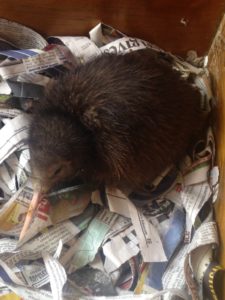Dehydrated kiwi are searching for water on the Kiwi Coast as Northland’s long dry summer continues.
A drought is close to being declared in Northland, with no significant rainfall since late November in much of the region. The ground is dry and hard – making it difficult for kiwi to probe the ground for food. As the bills of kiwi chicks are softer than those of adults, dry conditions are especially hard on the young.

Todd Hamilton from Backyard Kiwi was alerted to a dehydrated kiwi by Whangarei Heads locals last week. The 10 day old kiwi chick was immediately taken into the Whangarei Native Bird Recovery Center for attention.
Robert Webb, from the Whangarei Native Bird Recovery Centre says there was concern as the dehydrated and stressed chick initially lost weight. However, after tucking in to a few good meals of ground oxheart and vitamins, it’s weight is now up to 219 grams. If the good recovery continues, the chick will be able to be returned to the predator controlled Whangarei Heads peninsula once the rain finally arrives.
A live web cam (Web Cam 2) showing the kiwi’s cage is keeping people up to date with it’s progress – best viewed at night when s/he is most active.
Todd says “Like Northland farmers, kiwi are having a tough time right now. Kiwi get most of their moisture from their food so are having to forage longer and further than usual. This means they may turn up in unusual places, so now more than ever it’s important dog’s are kept under good control and not allowed to wander”.
Robert agrees: “Some small creeks and wetlands have now dried up. We’ve had kiwi chicks brought into us that have been found curled up in a ball in the middle of a paddock under the hot sun. It appears they’ve wandered out into the grass to get the morning dew, then been caught out when the sun’s come up”.

Owhiwa Landcare landowners were delighted to find a juvenile kiwi wandering around their backyard at 7am on a misty morning just before Christmas. With kiwi in low numbers in the area, sightings of kiwi are very rare. It appears this kiwi too was on the lookout for any moisture it could find.
Todd adds: “Last time we had a long dry spell like this kiwi were found in swimming pools, troughs made from baths and fish ponds and some drowned. Kiwi can swim short distances but cannot climb slippery smooth sides. An easy way to fix this is to add a plank or some bricks or rocks to low pools or troughs so kiwi can clamber out again.”
If you see a stressed kiwi during the day and are concerned, ring the Native Bird Recovery Centre (09 438 1457) or the Department of Conservation (09 470 3304) immediately and they will advise you what to do next.
The Whangarei Native Bird Recovery Centre is a voluntary organisation. If you would like to make a donation to help support their work in helping birds like kiwi survive click here.



